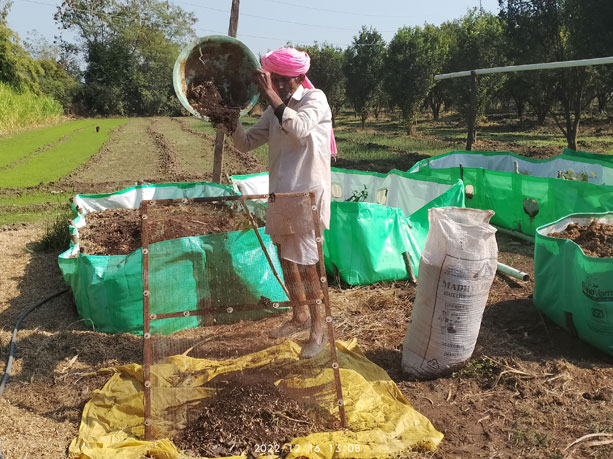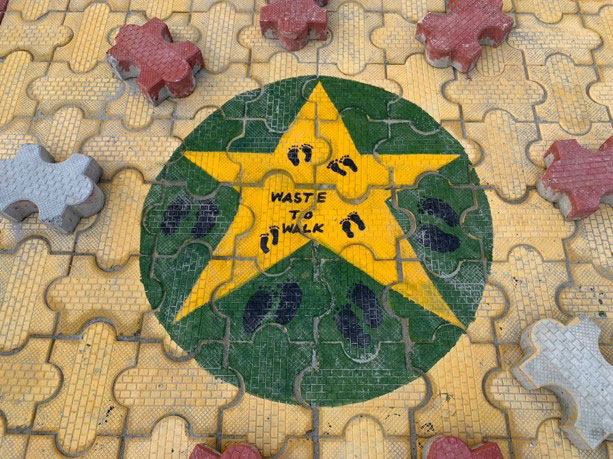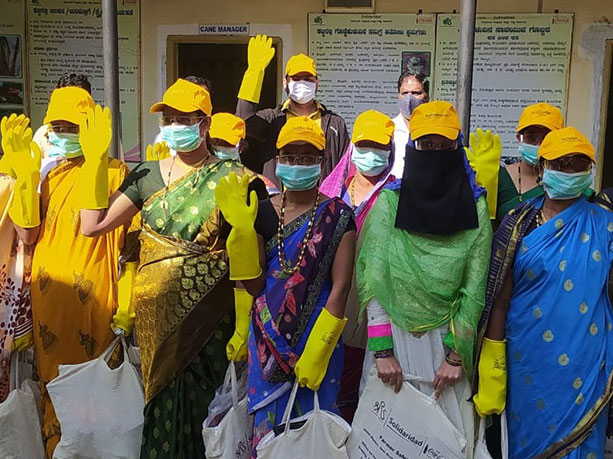Solidaridad Regional Expertise Centre (SREC) is driven by its vision and mission, through which it seeks to address the challenges posed by India’s rapidly increasing population and an equally rapid reduction of its poverty, putting pressure on its land and water resources. Today, consumers want more food, more fibre for cloth and more feed for their animals. SREC believes that this ever-growing demand can be sustained only if the agricultural sector makes a transition towards smart and sustainable land and water use, increase its production by adopting efficient processes, coupled with less pollution, greater precision in the use of fertilisers and pesticides, and a reduction in the use of water and energy.
SREC is working together with small farmers, workers, local authorities, private sector and research institutes as a catalyst for improved food production, a safer workplace, access to clean water, and a better income.
SREC Centre is a Charitable Trust established in December 2008, registered under the Indian Registration Act, 1908 and 80 G & 12 AA of The Income Tax Act, 1961. Wherein we,


Sixty-five-year-old Kanwar Lal of Narwal village in Agar Malwa district of Madhya Pradesh had been practicing chemical intensive farming on his 8-acre land for several years read more

How one of the largest leather clusters in India is turning to sustainability, one block at a time, with Solidaridad Regional Expertise Centre’s ‘Waste to Walk’ read more

Forty-two-year-old Indira Kadam is an anganwadi worker in Munoli village in Belagavi district of Karnataka in southern India. A single woman, she read more
Issue/Volume: 31/02



In Kanpur–Unnao Leather Cluster, A Dedicated Resource Centre for Women Extends Support
On 30 June, a dedicated Resource Centre for Women in the Leather Value Chain was launched in the Kanpur–Unnao Leather Cluster. Spearheaded by Solidaridad, and supported by the Small Industries Development Bank of India (SIDBI), the centre was inaugurated by Manoj Mittal (CMD, SIDBI), marking a powerful commitment to uplifting women who have, for long, made silent but important contributions to the leather sector.
The centre—the first of its kind in the Kanpur Unnao Leather Cluster—is equipped with modern machinery, expert trainers, and a comprehensive curriculum designed to foster collective women-led entrepreneurship.
With a focus on skill-building, certification, and entrepreneurship, the centre will train over 250 women in leather-product manufacturing, helping them gain formal identities and recognition for their hard work.

Stakeholder Engagement Session Charts Sustainability Roadmap for Kolkata Leather Cluster
In Kolkata, we recently conducted a stakeholder consultation workshop on Empowering Sustainability as part of the ongoing FVO project "Effective Waste Management in Bantala Leather Cluster through Circular and Sustainable Practices." The workshop saw a diverse group of stakeholders and participants representing tanneries and leather goods manufacturers.
The event served as a critical platform to share updates, highlight achievements, future activities and gather inputs on the sustainable transformation for the Kolkata leather cluster. Key aspects highlighted in the discussion include solid waste management, green job creation, gender sensitization (through special activities), and occupational health and safety.
Through mutual learning and collaborative discussion, the event successfully fostered stakeholder alignment on future interventions and sustainability goals.

Interaction with Potential Stakeholders of MKUY Scheme Eases Coordination Worries
An interface meeting with probable stakeholders of the Mukhyamantri Krushi Udyog Yojana (MKUY) scheme was conducted at the Center of Excellence (CoE), Bantala, earlier this month. The session, facilitated by Dibya Darsini Behera (District Coordinator, Agricultural Promotion & Investment Corporation of Odisha Limited or APICOL) first outlined the eligibility criteria, application procedure, subsidy norms and required documentation for the scheme. It then spread awareness, among beneficiaries, regarding the nitty-gritties of the MKUY scheme and subsidies that can be availed under it.
How did we identify beneficiaries and stakeholders for this scheme? Under the Smart Agri Project, we selected some stakeholders who are keen to venture into commercial agri-entrepreneurship. The MKUY scheme, promoted by APICOL, encourages such agri-entrepreneurs to apply and avail of its benefits. Mostly, activities—such as poultry farming, dairy farming, mushroom cultivation, integrated farming, pisciculture, and white pig rearing—are preferred.
The interface programme also featured an interactive session where participants had their doubts resolved, and received guidance on business planning and the documentation process. The programme ended with a resolution to ease coordination between the stakeholders, the Smart Agri Project, and the District Coordinator, APICOL.

Multi-stakeholder Workshop Outlines Problems with India’s Seed Sector, Offers Solutions
A sustainable seeds sector can improve agriculture in India, and support millions of farmers in rural areas with sustainable livelihoods. However, it faces several challenges ranging from farmers' lack of access to quality seeds, to climate change.
It is with the aim of identifying these challenges and strategizing long-term solutions that Solidaridad and SeedNL recently held a multi-stakeholder consultation workshop in Indore, Madhya Pradesh. The workshop—the second in a series organized under the “Strengthening Seed Supply Chain for Sustainable Livelihood & Food Security” initiative—saw experts from organizations such as NAFED, BASF and the Indian Institute of Soybean Research discuss recommendations and suggestions for a sustainable seeds sector.

Maharashtra Krushi Din Events Highlight Ways for Low-Cost, Regenerative Agriculture
On 1 July, we organized events on the occasion of Maharashtra Krishi Diwas at different programme locations in the state.
Our staff and experts as well as officials from the agriculture department, and Block Development Officers, served as resource persons for these events. In current times, farming is seen as more of an investment with minimum returns. During these sessions, we therefore discussed the importance of good agricultural practices, in order to reduce the cost of cultivation and benefit the farmers. Farmers were also advised on low-cost bio-input preparation, use of tools such as yellow sticky traps, blue sticky traps and pheromone traps for pest management.

Knowledge Transfer Workshops in Maharashtra Equip Farmers with Information on Maintaining Agricultural Equipment
Knowledge transfer workshops play an important role in educating farmers about the functions, health and maintenance of agricultural equipment. This month, online workshops were conducted at equipment sites in Maharashtra’s Amravati and Yavatmal districts.
Besides mobilizing farmers for these workshops, our team also provided orientation on the maintenance of equipment, and guided them on checking and monitoring the functioning of equipment. In this, we were supported by experts from equipment manufacturers Pessl, who joined the workshop virtually.
Through the workshop, the participating farmers gained useful insights on the parts and functions of different equipment, and measures to be taken if the tools malfunction or require technical assistance.

Capacity Building Sessions in Amravati Yield Insights for Kharif Cropping Season
Throughout July, farmers in Amravati district, Maharashtra, received some timely guidance for the ongoing kharif season, through a series of capacity-building sessions. During the first half of the month, the training focused on various aspects—seed selection, seed treatment, seed sowing, seed germination, gap filling. In the second half of the month, the sessions focused on intercultural operations and integrated pest management in cotton and intercrops.
Farmers were also guided on drenching with jeevamrut, and were advised on the importance of bund planting and the application of bio inputs. Some plantation activities were also conducted in convergence with the gram panchayats of different villages.

Training Sessions in Nagpur Provide Lessons on Good Agricultural Practices, Financial Literacy, and More
Our team in Maharashtra recently conducted capacity-building sessions for farmers on different topics in Nagpur district. These sessions were held in convergence with the agriculture department and Maharashtra State Rural Livelihood Mission (MSRLM). The sessions featured participation from self-help group (SHG) members and farmers.
The staff discussed gap filling and intercultural operations, as well as preparation of jeevamrut for nutrient management, and neemarka and dashaparni for pest management. On the other hand, agriculture department officials spoke about crop insurance and good agricultural practices, while MSRLM officials instructed SHG members on financial literacy. Solidaridad experts guided SHG members and farmers on the creation of green jobs and agri-enterprises. During the sessions, plantation activities were also carried out at programme locations.

EU Workshop Highlights Key Aspects of Effective Communication for Solidaridad Participants
Participants from Solidaridad and its partner Centre for Advanced Research and Development (CARD) recently attended a communications workshop hosted by Solidaridad on 25 July. The workshop, conducted in Mandla, Jabalpur division, Madhya Pradesh, focused on equipping participants with the skills and knowledge necessary to effectively communicate.
The event covered topics such as branding, visibility and crafting effective messaging—all in alignment with EU’s rules, principles and standards. It also acknowledged EU’s support and funding in development matters.

Defying Age, Dayaram and Maya Spearhead an Agricultural Transformation,
Dayaram Patidar and his wife Maya Bai, both above 70, may have just ushered in a regenerative agriculture revolution in the Rusalpura gram panchayat in Ratlam district, Madhya Pradesh.
With a passion for learning and bringing about change, the couple learned and adopted regenerative agriculture, not just to improve soil fertility but also unlock new streams of income. Dayaram, who used to cultivate groundnuts on half an acre of land using chemical fertilizers and pesticides, was introduced to regenerative alternatives like vermicompost, cow dung tonic, neem-based pest repellents, and jeevamrut, with our support.
The results soon followed. “Earlier, I used to harvest only 4–5 quintals of groundnut from the same land. This time, I have got 11 quintals, earning ₹66,000. Plus, I saved ₹2,200 on chemical inputs. Going forward, I plan to stop using chemical fertilizers and pesticides altogether,” says Dayaram.
In the meantime, his wife Maya Bai took charge of producing vermicompost (using cow dung, dry leaves, vegetable peels, and earthworms) at home. Within three months, she prepared the first batch and applied it to the mustard, chili, and tomato crops. Encouraged by the results, she soon expanded production. So far, she has produced 30 quintals of vermicompost, out of which 16 quintals have already been sold at ₹400 per quintal.
Their joint efforts have inspired many others. Today, more than 10 farmers in Rusalpura have started moving towards regenerative agriculture.Maya Bai says, “We’ve brought our soil back to life. Now we dream of using this income to support our grandchildren’s education, and secure their futures.”
“Farmers like Dayaram ji and Maya ji are paving the way for self-reliance in edible oil production in India,” states Suresh Motwani, General Manager, Solidaridad.

An educational workshop on the benefits of the National Pension System (NPS) for employees was conducted on 21 July 2025.
The session offered valuable insights into fund investment options, withdrawal procedures, and post-retirement benefits. It was facilitated by our POP (Point of Presence) representative, and was well received by the staff, significantly contributing to their financial literacy.